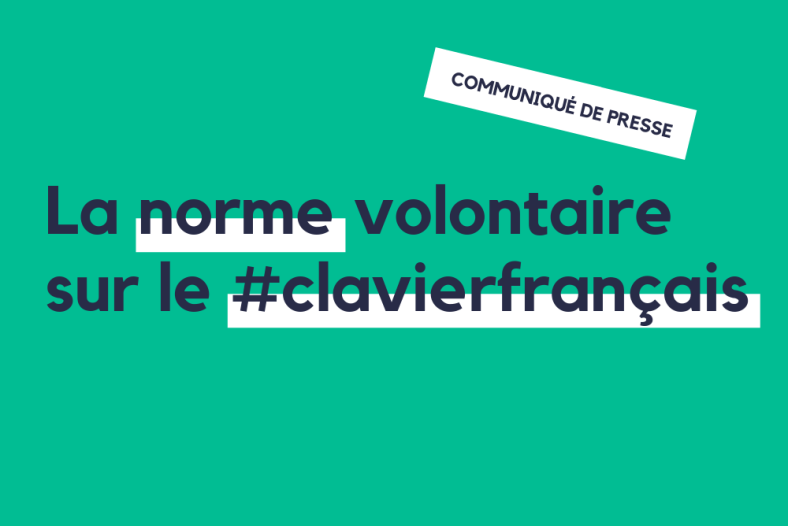French keyboard, finally a voluntary standard to make it easier to enter all characters

Did you know that writing capital letters without accents is incorrect and can lead to confusion? This is an example of the bias generated by flaws in the “azerty” keyboard model, which takes its name from the first six alphabetic keys on the keyboard. Some characters that are widely used in the French language are absent from keyboards: for example, the “e in the a” ligature for “et caetera”, or the “e in the o” for “œuf”. Others are difficult to access or absent, depending on the operating system. This is the case, for example, with capital [é] and [ç].
Accents and midpoints
Current “azerty” keyboards also restrict the input of regional languages. In Occitan, it must be possible to add grave and acute accents to all vowels, which is difficult to do today with a basic keyboard; in Catalan, the midpoint must be accessible; Breton and Corsican require the use of the tilde n… In a context of European openness, it therefore became urgent to facilitate the writing of languages in the Latin alphabet: eszett in German, the tilde in Castilian and Portuguese, inverted question marks and exclamation marks, the barred O in Danish and Norwegian…
These findings, shared in 2015 by the Delegation Générale à la Langue Française et aux Langues de France [1] (Ministry of Culture), prompted the launch of a project entrusted to AFNOR: to bring together stakeholders capable of defining optimal arrangements for writing more easily with a keyboard. Difficulty within difficulty: in the absence of a reference “azerty” model, models vary from one keyboard manufacturer to another, and from one computer operating system to another. The @ and € symbols, for example, are not always available in the same place.
Enhance writing skills
After more than three years’ work, and a public inquiry that gathered thousands of comments consolidated in the final document, AFNOR is today publishing the result of this collective project: a voluntary standard that responds to all the issues identified by delivering a set of specifications enabling operating system publishers and keyboard manufacturers to adjust French keyboards, without revolutionizing them. Referred to as ” NF Z71-300 “, this voluntary standard proposes character layouts and engraving rules for the materialization of characters and symbols.
An optimized azerty
The NF Z71-300 standard proposes two keyboard models, each offering the same writing capabilities, but geared to different audiences and uses. The first is an optimized azerty model. The 26 letters of the alphabet and the numbers don’t change place, unlike certain other signs such as certain accented vowels, the arobase, punctuation, the hash (hashtag), currency symbols, braces…. Interested users will therefore be able to easily integrate these evolutions.

Optimized “azerty” keyboard model (NB: the illustration shows only the characters visible on the keyboard; other characters are available with key combinations).
The second proposed model, known as “bepo”, is already widely used by a community of enthusiasts. The project has increased the possibilities offered by dead keys, and has no impact on key engraving. Today, this model is recognized as offering the most ergonomic and efficient layout possible for inputting French and other Latin-script languages, as well as for programming.

Optimized “bepo” keyboard model (NB: the illustration shows only the characters visible on the keyboard; other characters are available with key combinations).
A new market for manufacturers
The NF Z71-300 standard is now available to keyboard manufacturers wishing to bring new models to market. It’s up to them to comply, bearing in mind that their corporate and public sector customers could make this a prerequisite in their calls for tender to renew their office equipment.
Press contact:
To receive the French keyboard standard and find out more: Anne-Lise François – 01 41 62 84 17 – France Voir l'email
2 minutes to understand the voluntary French keyboard standard
About AFNOR
AFNOR is the French reference organization for voluntary standards. It manages the collection of existing documents and coordinates the work of interested parties in the creation and revision of standards, as well as in the identification of subjects that could provide the basis for the development of new ones. Launched on the initiative of market players, a voluntary standard is a reference framework designed to provide guidelines, technical or qualitative prescriptions for products, services or practices serving the general interest. Anyone can participate in its creation, and any organization may or may not use and refer to it. This is why the standard is called voluntary. As coordinator of standardization in France, AFNOR has one ambition: to contribute to the dissemination of best practices and effective solutions, for the benefit of all. https://normalisation.afnor.org